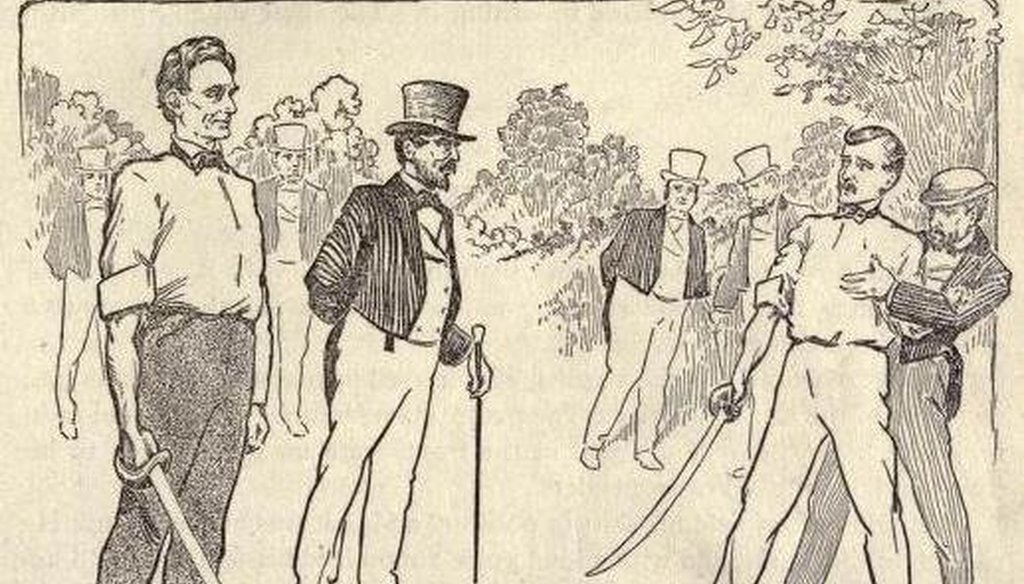Stand up for the facts!
Our only agenda is to publish the truth so you can be an informed participant in democracy.
We need your help.
I would like to contribute

Abraham Lincoln and James Shields meet for a duel in 1842. (Abraham Lincoln Presidential Library and Museum)
Did Abraham Lincoln challenge a rival to a sword fight?
If Your Time is short
-
As a young lawyer and politician, Abraham Lincoln engaged in a duel involving swords. However, he was not the one to make the challenge; his rival did.
-
The two men faced off on a river island in Missouri but decided to call off the duel before any fighting started.
With an unruly House speaker election and sharp words in the Senate over blocked military promotions, the current Congress has hardly been sedate. But tempers flared to a notable level Nov. 14.
One Republican House member accused another of kidney-punching him in a Capitol hallway. A Republican House committee chairman called a Democrat a "smurf." And Sen. Markwayne Mullin, R-Okla., got into a heated exchange with International Brotherhood of Teamsters President Sean O’Brien at a committee hearing.
Mullin read aloud a series of O’Brien’s social media posts, including one in which he appeared to challenge Mullin to a fight. Mullin then asked O’Brien, who was testifying at the hearing, if he wanted to fight there and then.
"I’d love to do it right now," O’Brien said.
"Well, stand your butt up then," Mullin replied.
"You stand your butt up," O’Brien responded.
Senate Health, Education, Labor and Pensions Committee Chair Bernie Sanders, I-Vt., tried to gavel them down.
Sanders yelled at Mullin to sit down, banged his gavel several times and told both of them to stop talking. But the argument lasted for several minutes.
The following day, Mullin defended himself in an interview with CNN’s Dana Bash, arguing that Washington has a long history of political figures fighting each other, including President Andrew Jackson and an incident in the Capitol in which a reporter shot and killed a former congressman with whom he’d feuded.
At one point, Mullin invoked President Abraham Lincoln. "Abraham Lincoln challenged a guy to a sword fight," Mullin told Bash.
Almost two decades before he became president, Lincoln did engage in a duel. But it was the other way around; Lincoln was the one who was challenged.
Mullin’s office did not respond to an inquiry for this article.
An account by the American Battlefield Trust, a non-profit organization that helps conserve historic battlefields, says the 1842 duel occurred early in Lincoln’s career as a lawyer and politician. It stemmed from a feud he had with Illinois State Auditor James Shields over a decision to close the Illinois State Bank.
The editor of the Sangamo Journal, a friend of Lincoln, let Lincoln write a letter critical of Shields under the pen name "Rebecca." When Shields demanded to know who had written the letter, the editor revealed that it was Lincoln. Shields demanded a retraction, and when Lincoln refused, Shields challenged him to a duel on a river island in Missouri, where dueling was legal.
According to the American Battlefield Trust:
"Since Lincoln was challenged by Shields he had the privilege of choosing the weapon of the duel. He chose cavalry broadswords ‘of the largest size.’ ‘I didn't want the damned fellow to kill me, which I think he would have done if we had selected pistols,’ he later explained. For his own part, he did not want to kill Shields, but "felt sure (he) could disarm him" with a blade. At six feet, four inches tall, Lincoln planned to use his height to his advantage against Shields, who stood at a mere five feet, nine inches tall.
"The day of the duel, September 22, arrived and the combatants met at Bloody Island, Missouri, to face death or victory. As the two men faced each other, with a plank between them that neither was allowed to cross, Lincoln swung his sword high above Shields to cut through a nearby tree branch. This act demonstrated the immensity of Lincoln’s reach and strength and was enough to show Shields that he was at a fatal disadvantage. With the encouragement of bystanders, the two men called a truce."
Michael Burlingame, a University of Illinois, Springfield historian and author of "Lincoln: A Life" and "An American Marriage: The Untold Story of Abraham Lincoln and Mary Todd," told PolitiFact that the American Battlefield Trust account is accurate and that Lincoln was not the party who made the challenge to duel.
Our ruling
Mullin said, "Abraham Lincoln challenged a guy to a sword fight."
Lincoln did agree to a duel involving swords, but he was not the one to make the challenge; his rival did. The two men met on a river island in Missouri but called off the duel before it started.
We rate the statement Half True.
PolitiFact staff writer Samantha Putterman contributed to this report.
Our Sources
Markwayne Mullin, interview with CNN’s Dana Bash, Nov. 15, 2023 (accessed via TVEyes)
American Battlefield Trust, "Abraham Lincoln's Duel," Jan. 17, 2014
Politico, "Burchett on McCarthy elbowing: ‘I prayed for him,’" Nov. 15, 2023
USA Today, "'You look like a Smurf': Comer gets into heated exchange with Moskowitz during hearing," Nov. 14, 2023
Associated Press, "GOP senator challenges Teamsters head to a fight in a fiery exchange at a hearing," Nov. 14, 2023
NPR, "A Historic Killing in the Capitol Building," Feb. 19, 2007
Google Books, "Lincoln and the Irish," accessed Nov. 16, 2023
Email interview with Ronald C. White Jr., author of "A. Lincoln: A Biography," Nov. 16, 2023
Email interview with Michael Burlingame, University of Illinois-Springfield historian and author of "Lincoln: A Life" and "An American Marriage: The Untold Story of Abraham Lincoln and Mary Todd," Nov. 16, 2023
Browse the Truth-O-Meter
More by Louis Jacobson
Did Abraham Lincoln challenge a rival to a sword fight?
Support independent fact-checking.
Become a member!
In a world of wild talk and fake news, help us stand up for the facts.




































